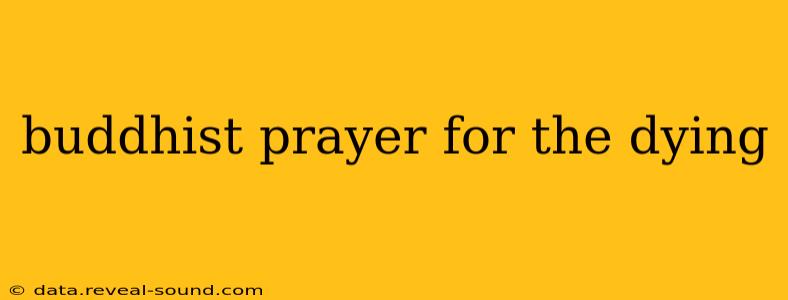The passing of a loved one is a deeply emotional experience, and for those with Buddhist beliefs, offering prayers for the dying can provide solace and support during this difficult time. Buddhist traditions offer a range of prayers and practices aimed at easing the transition from this life to the next, promoting peace and compassion for both the dying person and those left behind. This guide explores various Buddhist prayers and rituals often used during this time, aiming to provide understanding and comfort.
What are Common Buddhist Prayers for the Dying?
Buddhist prayers for the dying aren't standardized single chants; instead, they draw from a rich tapestry of practices emphasizing mindfulness, compassion, and the impermanence of life. The specific prayers used will vary depending on the individual's lineage (e.g., Tibetan Buddhism, Theravada Buddhism, Zen Buddhism) and personal preferences. However, many share common themes:
-
Reciting the Buddha's name: Repeating the name of the Buddha (e.g., Amitabha Buddha, Avalokiteshvara) is a common practice, believed to invoke blessings and positive energy. The repetition acts as a calming mantra, focusing the mind amidst the chaos of death.
-
Chanting sutras: Specific sutras, such as the Amitabha Sutra or the Heart Sutra, are often chanted. These scriptures contain teachings on enlightenment, compassion, and the path to liberation, offering comfort and spiritual guidance.
-
Offering prayers of compassion: Prayers focused on cultivating compassion for the dying individual and sending loving-kindness are central. These prayers aim to ease suffering and create a peaceful environment.
-
Visualizations: Many Buddhist traditions involve visualizations, such as visualizing the deceased being guided by compassionate beings to a peaceful rebirth.
How Can I Help Someone Dying with Buddhist Beliefs?
The most important act is to offer compassionate presence. This may involve:
- Maintaining a calm and peaceful atmosphere: Reduce stress and noise around the dying person. A quiet, serene environment can aid in their peaceful transition.
- Reciting prayers or mantras: If you are comfortable and familiar with Buddhist prayers, reciting them quietly near the dying person can be a source of comfort and strength.
- Offering encouragement and support: Simply being present and offering words of encouragement and support can be invaluable. Focus on listening and providing emotional comfort.
- Respecting their wishes: Be mindful of the dying person’s wishes regarding religious practices or rituals. Their agency and preferences should always be respected.
- Providing comfort measures: Practical support, such as arranging for comfortable bedding or assisting with basic needs, is also a significant form of care.
What Happens to the Soul After Death in Buddhism?
Buddhist teachings don't describe a "soul" in the traditional sense. Instead, they speak of karma and rebirth. After death, consciousness is believed to continue, influenced by the actions and intentions of the individual's lifetime. This karma shapes the next life, a cycle of birth, death, and rebirth (samsara) which Buddhists strive to transcend through practices like meditation and ethical conduct. The specific details of what occurs after death vary across different Buddhist schools of thought.
Are there specific rituals after death in Buddhism?
Buddhist funeral rites vary significantly across different traditions. Common elements often include:
- Preparing the body: Respectful preparation of the body is paramount, often involving bathing and dressing.
- Memorial services: Memorial services often include chanting, prayers, offerings, and sharing of memories.
- Cremation or burial: Both cremation and burial are acceptable practices.
- Post-death practices: Practices such as making offerings and continuing to chant prayers for the deceased's positive rebirth are common in many traditions.
What are some examples of specific Buddhist prayers or mantras used for the dying?
Providing specific prayers and mantras requires caution, as their precise pronunciation and context are crucial. It's recommended to consult with a Buddhist teacher or community leader for accurate guidance and appropriate usage. Improper recitation can diminish the intended effect.
This information offers a general overview of Buddhist prayers for the dying. For personalized guidance and practices, connecting with a local Buddhist temple or spiritual leader is highly recommended. The support and wisdom of the community can offer invaluable comfort and direction during this challenging time.
